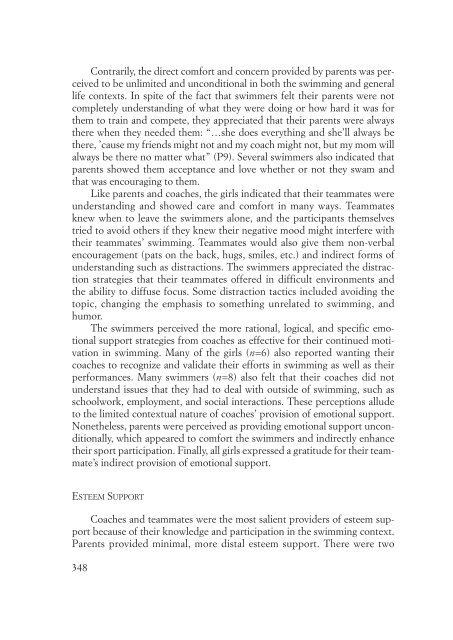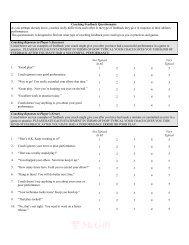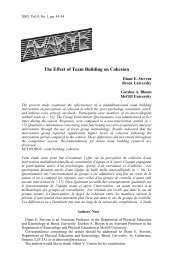International Journal of Sport Psychology
International Journal of Sport Psychology
International Journal of Sport Psychology
You also want an ePaper? Increase the reach of your titles
YUMPU automatically turns print PDFs into web optimized ePapers that Google loves.
Contrarily, the direct comfort and concern provided by parents was perceived<br />
to be unlimited and unconditional in both the swimming and general<br />
life contexts. In spite <strong>of</strong> the fact that swimmers felt their parents were not<br />
completely understanding <strong>of</strong> what they were doing or how hard it was for<br />
them to train and compete, they appreciated that their parents were always<br />
there when they needed them: “…she does everything and she’ll always be<br />
there, ’cause my friends might not and my coach might not, but my mom will<br />
always be there no matter what” (P9). Several swimmers also indicated that<br />
parents showed them acceptance and love whether or not they swam and<br />
that was encouraging to them.<br />
Like parents and coaches, the girls indicated that their teammates were<br />
understanding and showed care and comfort in many ways. Teammates<br />
knew when to leave the swimmers alone, and the participants themselves<br />
tried to avoid others if they knew their negative mood might interfere with<br />
their teammates’ swimming. Teammates would also give them non-verbal<br />
encouragement (pats on the back, hugs, smiles, etc.) and indirect forms <strong>of</strong><br />
understanding such as distractions. The swimmers appreciated the distraction<br />
strategies that their teammates <strong>of</strong>fered in difficult environments and<br />
the ability to diffuse focus. Some distraction tactics included avoiding the<br />
topic, changing the emphasis to something unrelated to swimming, and<br />
humor.<br />
The swimmers perceived the more rational, logical, and specific emotional<br />
support strategies from coaches as effective for their continued motivation<br />
in swimming. Many <strong>of</strong> the girls (n=6) also reported wanting their<br />
coaches to recognize and validate their efforts in swimming as well as their<br />
performances. Many swimmers (n=8) also felt that their coaches did not<br />
understand issues that they had to deal with outside <strong>of</strong> swimming, such as<br />
schoolwork, employment, and social interactions. These perceptions allude<br />
to the limited contextual nature <strong>of</strong> coaches’ provision <strong>of</strong> emotional support.<br />
Nonetheless, parents were perceived as providing emotional support unconditionally,<br />
which appeared to comfort the swimmers and indirectly enhance<br />
their sport participation. Finally, all girls expressed a gratitude for their teammate’s<br />
indirect provision <strong>of</strong> emotional support.<br />
ESTEEM SUPPORT<br />
Coaches and teammates were the most salient providers <strong>of</strong> esteem support<br />
because <strong>of</strong> their knowledge and participation in the swimming context.<br />
Parents provided minimal, more distal esteem support. There were two<br />
348




